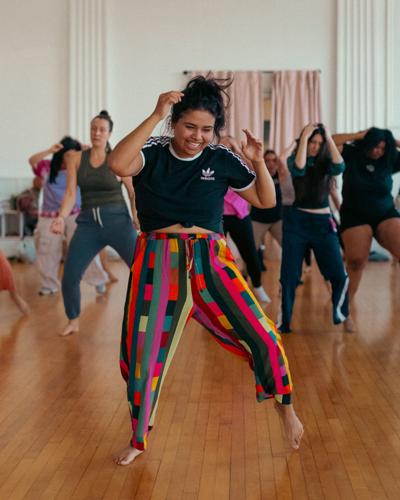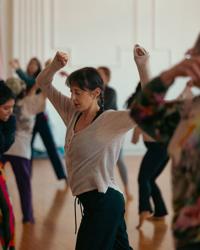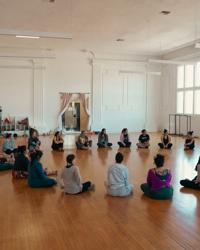
For professional dancer and teacher Isis Avalos, dance is more than physical movement—it’s a sacred expression of her spirituality, a way to connect with something beyond herself.
“That's what I feel I'm connected the most [with] in my spirit and in my being,” she said. In times of grief, change and loneliness, movement has been her lifeline—a way to return to herself and find healing.
She remembers being the girl who organized the first dance team in her middle school in South Texas, choreographing routines from her favorite songs playing on MTV. “I would always imagine myself, like one day I'm gonna live in a big city, one day I'm gonna dance,” said Avalos.
But dance quickly became more than a creative outlet. It became her refuge.
In high school, she struggled with body image and an eating disorder. The mirror became a place of pain. Movement, on the other hand, felt like freedom. “I couldn’t escape the mirror,” she said. “But I could escape when I was dancing. I felt like I wasn't lacking anything. I was enough. When I was moving and dancing in my body, there were moments where I would dance and then feel like so powerful […] I was like a superhero when I was fully in my body.”
After graduating with a degree in dance from the University of North Texas, Avalos moved to Los Angeles to pursue her lifelong dream. Within a year and a half, she joined a prestigious dance company and went on tour. New York City was her first stop, and she was thrilled to be living her dream.
But the dream came with a cost. As the years passed, the joy that once animated her began to dim. The pressure to create, perform and survive as a working dancer in an underfunded field began to wear her down.
The tension reached a breaking point after Avalos became a mother. Though the company initially supported her maternity leave, she returned to growing discontent. She started advocating for dancers to receive credit for the pieces they created for the company. “I became basically like the voice in the company that was advocating for the dancers. Because […] I wasn't going to take it anymore. I had been in the company for a really long time,” she explained. The pushback was swift and painful.
In early 2020, just under a year after giving birth and suffering from postpartum depression, Avalos was let go. “It was a very traumatic exit for me,” she said. “I didn’t see it coming […] I was left with a broken heart.” Then the COVID-19 pandemic hit. “I was grieving my dance self. I was grieving my old self before being a mother, and then I was grieving the state of the world […] I stopped dancing probably for a whole year,” she said.
But healing doesn’t follow a set schedule—it unfolds in its own time. For Avalos, it began quietly, with pelvic floor exercises and gentle stretching. She started playing music in her kitchen, slowly reconnecting with her love for dance. “The music called to me and I would just break out into dance,” she explained. “And then I thought to myself, this is [it], this is the essence of dancing.” For her, this new and powerful chapter was not about accomplishment. It was about dancing simply because it brought her joy and the sense of being fully present in the moment.

In reclaiming dance, Avalos reimagined it—not as performance or perfection but as a vessel for healing. Out of that transformation came aTRAVIESA, a dance session and community space grounded in joy, movement and radical acceptance at Pieter Performance Space in Lincoln Heights. Avalos is currently on maternity leave and plans to resume classes in January 2026. You can stay updated by following her on Instagram.
The word—a play on the Spanish atravesar, meaning “to go through”—speaks to transformation, to the act of moving through change. For Avalos, everyone evolves through different versions of themselves, and her class offers space for that evolution. It’s also an invitation to be a traviesa—“cheeky”—throughout the process, “tapping into that grooviness of you, […] feeling good unapologetically,” she encouraged.
An aTRAVIESA class begins in a circle, where participants check in with their name, pronouns and intention for the session. Then, grounding and breathing practices are on the menu to bring awareness to the body and physical space. Through a curated playlist—soft R&B, boleros, reggaetón, salsa and Afro-Latin beats—the group moves together in guided rhythm. The energy builds slowly, from somatic exercises and gentle tapping to full-bodied jam sessions and collective movement with a modern dance background that she explains are accessible for all body types and most mobility capacities.
“I want to get you to that place where you start to feel the music, and don't judge yourself, don't judge yourself for it and just let it out,” she said, adding that dance is a powerful way to reconnect with the body—a form of expression that goes beyond words. She believes that when people move without self-judgment, they access a more profound truth about how they feel.

In a world that prioritizes mental productivity, she urges individuals to listen to their physical selves, seeing the body not as separate from the mind but as a vital source of insight and healing. To her, tuning into the body’s signals through movement is not only liberating, it’s essential to overall well-being—more impactful, even, than the constant mental chatter.
Avalos brings a joyful presence to every room—her laughter and energy have a way of lifting those around her. She embraces dance as sacred language—an intimate dialogue between her body and the divine, a channel through which she receives clarity, healing and purpose. In her view, the universe speaks in many forms—through people, nature, and the arts—but it is through movement that she feels most profoundly connected to her spirit. On the dance floor, each gesture becomes a form of prayer, each rhythm a reflection of something greater than herself.














(0) comments
Welcome to the discussion.
Log In
Keep it Clean. Please avoid obscene, vulgar, lewd, racist or sexually-oriented language.
PLEASE TURN OFF YOUR CAPS LOCK.
Don't Threaten. Threats of harming another person will not be tolerated.
Be Truthful. Don't knowingly lie about anyone or anything.
Be Nice. No racism, sexism or any sort of -ism that is degrading to another person.
Be Proactive. Use the 'Report' link on each comment to let us know of abusive posts.
Share with Us. We'd love to hear eyewitness accounts, the history behind an article.